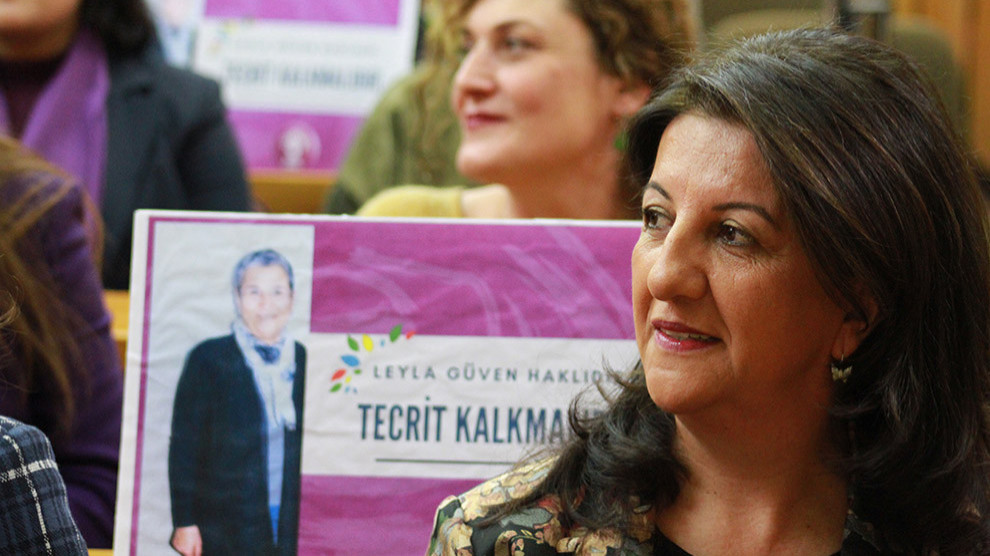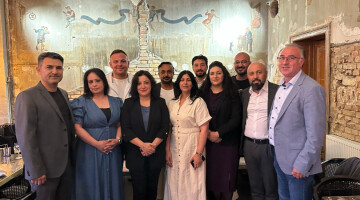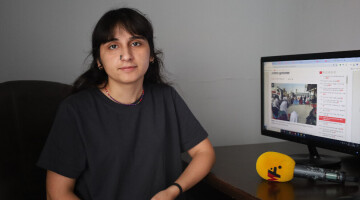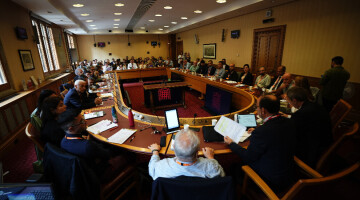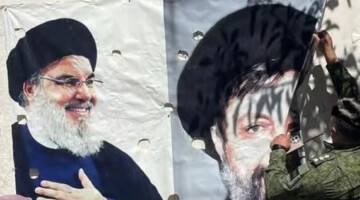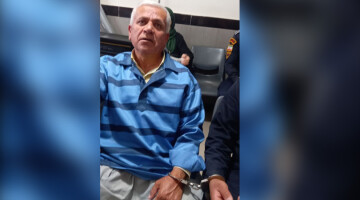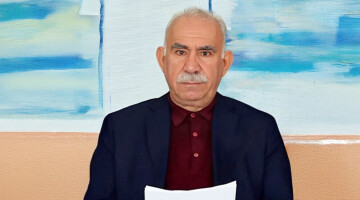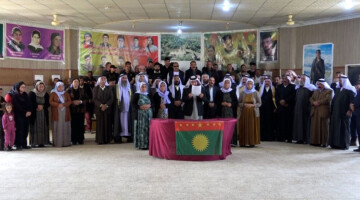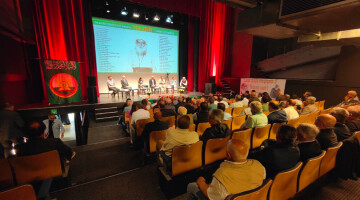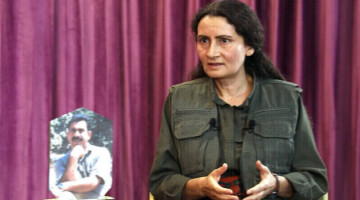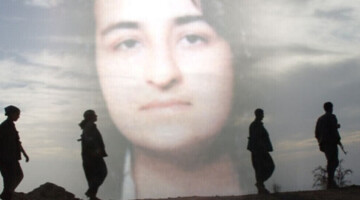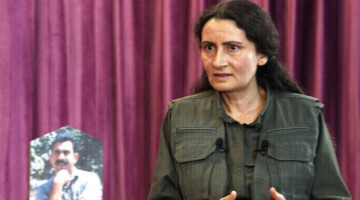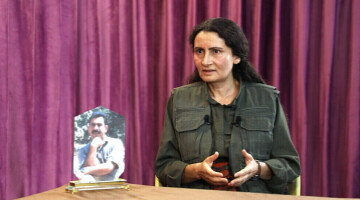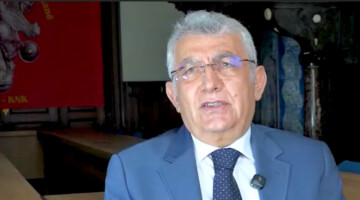In an interview with ANF, Kurdish politician and co-chair of the Peoples’ Democratic Party (HDP), Pervin Buldan, spoke about the background of the abduction of Abdullah Öcalan and the continuing isolation of the Kurdish leader on Imrali. Buldan warns of a massive crisis if the difficult prison conditions in the island prison continue.
What were the goals of the Turkish state and the powers involved in the kidnapping of Öcalan, and were they achieved?
The aims of the conspiracy were to reorganise the Middle East and, above all, Syria, to make Turkey dependent on the international system of rule, to foment a Kurdish-Turkish and Kurdish-Arab war and to eliminate the struggle of the Kurdish people for freedom, peace and democracy.
Öcalan has put a spoke in the wheel of those involved. He prevented this with his determination for peace and a solution. Imrali became a bridge of peace between the peoples. The peace project proposed by Öcalan became a great power of peace both for Turkey and for the entire Middle East.
The conspiracy also planned the destruction of the political will of the Kurds and the Kurdish question. That was not successful either. On the contrary, the Kurdish people, with their great political awareness and determined struggle for democracy and peace, became a tremendous force for change, both for Turkey and the Middle East.
On October 9, 1998, the will of Syria was broken and an attempt was made to isolate the Kurdish people by forcing Öcalan to leave the country. However, through the Kurds' struggle against the ISIS and for the construction of a free society, they became a folk that is regarded with great respect worldwide. In this sense, the conspiracy has also failed. It became clear that the strongest solution is not the international system and its nation states that separate the peoples and lead them to war against each other, but the construction of a democratic life of the peoples.
It has now been proven that neither in the Middle East, nor in Syria or Turkey, peace or balance is possible without respecting the will of the Kurdish people. Turkey and Syria are the most outstanding examples of this.
The point in which the conspiracy has been successful is that the political and economic system has become dependent on the international powers. Turkey has become a pawn in the game. The political impasse based on Kurdish hostility, into which Turkey has manoeuvred itself, has isolated it worldwide and made it a prisoner of the international powers.
How was it possible to allow the conspiracy to fail to such an extent?
The international conspiracy is not over. It continues through total isolation. By keeping Imrali's gate closed, an attempt is being made to isolate the peoples' demands for democracy, peace and freedom. Democracy, law and justice are being isolated. That is why breaking the isolation, opening the floodgates to peace and the doors of Imrali to democratic negotiations is a historical necessity and an obligation on all of us.
When you met with Öcalan as part of the "Imrali delegation", did he foresee that isolation might return?
Mr. Öcalan has repeatedly stressed that concrete steps are essential for the process to continue. At recent meetings he has repeatedly expressed that he considers a dialogue process necessary. At our last meeting he said: "If there are no concrete steps, the process will end and you won't be able to come here anymore." The phase has developed as he had foreseen. The government has not taken a single step towards a lasting solution. The Dolmabahçe Agreement was thrown into the trash and the dialogue was over. Thus the foundation was laid for further isolation.
The isolation on Imrali is considered to be a system or regime. Why does the government resort to isolation?
The isolation is the result of persistence in the policy of deadlock. The international system, as well as the state mentality dependent on this system, consider a Turkish-Kurdish peace, a peace in the Middle East and the development of a democratic process in the Middle East as an obstacle for the implementation of their interests. If the peoples take their democratic future into their own hands, it will mean the end of the nation states' interest politics. As they know this, they prevent a democratic solution and pursue an aggressive war policy. The monistic rule in Turkey also uses this policy and tries to keep its rule in power by fascism. That is why the state has implemented isolation. It has isolated the whole society, democracy and the opposition. Democracy, law, parliament, local government, civil society, trade unions, women and youth, they have all been isolated. The AKP/MHP alliance has implemented isolation, trustees, arrests and detentions and any authoritarian and repressive practice the basis for the continuation of its political system. The one-man rule, which is called the presidential system, is actually built on this isolation. The AKP/MHP alliance is based on Kurdish hostility and isolation. It has established a monistic regime against a solution, peace and democratisation. That is why it relies on isolation.
What do you think are the regional effects of isolation?
The dialogue process between 2013 and 2015 was terminated by the government. If a peaceful solution to the Kurdish question had not been prevented, if the government had listened to Öcalan, then the unleashed potential for a solution could also have reached Syria and the entire Middle East in the sense of democratisation. There would have been a democratic springtime for the entire Middle East and Turkey. Turkey would not have become a warring party in Syria and would not have supported jihadists. No more blood would have been shed in Syria and a process of democratisation would have begun there. But the international powers, which want to extend their dominance in Syria, have rejected the democratic alternative solutions and have launched their own war policy. The Turkish state and government have also based themselves on this and have seen their future in it.
The political price of insisting on war is a permanent state of coup. It is a system that spreads its hopelessness and isolation throughout the region. The greatest obstacle to peace in Syria today is isolation and the war policy that continues with isolation. Turkey is completely trapped in this situation. Öcalan's warnings have come true. The government that threw the Dolmabahçe agreement into the dustbin is losing out in the Idlib marsh and in Libya. Because they couldn't establish dialogue, they are in Moscow one day and in Washington the next. But the way to a solution is clear. The gates of Imrali must be opened for a return to dialogue and negotiations. Within ten days the political climate would change and a democratic process would begin for Turkey, as well as for Syria.
With the hunger strike led by Leyla Güven, visits to Imrali were won. However, this success was short-lived. How would you comment on this, what must happen now?
Our friend Leyla Güven led a great struggle and a dignified resistance against isolation. This struggle was able to make isolation a public concept in Turkey and put it on the agenda both in the country and internationally. The government reacted to this social pressure, and also in connection with the election campaign that was taking place at that time, by at least partially restricting the ban on lawyers' visits. With the lawyer and family visits, people started talking again about negotiations, chances for peace and a possible solution. At his last meeting with lawyers on August 7, 2019, Mr. Öcalan had declared: "I can solve the problem within two weeks." But the AKP government responded to this with a renewed total isolation. The renewed appointment of trustees in place of HDP mayors, which began on 19 August, was also a response. The government also aimed to occupy Syria. If we look at all these developments, we see the importance of waging an even stronger democratic struggle against isolation and of bringing this struggle together with the struggle for democracy. The unification of the struggles plays an important role in reducing the influence of the AKP. The HDP's struggle for a democratic alliance is also a struggle against isolation. This is a struggle that everyone who wants democracy must fight together. Everyone must be aware of this.
The Council of Europe's Committee for the Prevention of Torture and the other international institutions remain silent on isolation. What must be done?
The isolation is as inhuman as it is unlawful. Unfortunately, the EU has not adopted an attitude towards isolation in line with its democratic values and human rights conventions. The Kurds are being sacrificed for the sake of interests. That is the worst thing that can be done to the people. That is why the EU, the Council of Europe and the Committee for the Prevention of Torture have a responsibility to respect their own law and finally take the necessary steps to end isolation. It is a historic responsibility. The Kurdish question is also a question for Europe. The Kurdish question is an international question. No one can avoid it.
Is there anything else you wish to say?
Because of 21 years of resistance, the international conspiracy could not succeed. Instead of learning from history, the regimes continue to rely on the war. If they think they can achieve anything with it, they're wrong. We have a wish. The possibilities of democratic politics must be widely used. There is no alternative to democratic negotiations. Turkey is now collapsing politically, economically and socially. This is due to its insistence on deadlock. As long as this continues, there will be even greater crises and coups in Turkey. This must stop. The people in Turkey do not have to live under fascism. They are not without alternative. The democratic alternative that the HDP has created can open up such a path. We must all set out together to confront fascism and impoverishment and build democracy, justice, peace and freedom together. We will succeed in this.

